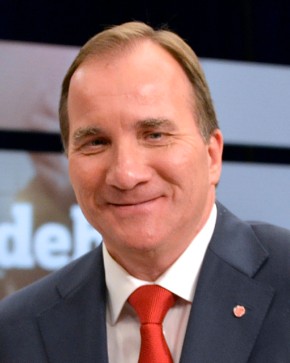 Frankie Fouganthin
Frankie Fouganthin
Sweden’s Prime Minister Löfven Staunchly Defends TTIP While in DC
By Mark Melton
On March 31, Sweden’s Prime Minister, Stefan Löfven, spoke at Brookings Institution about how nations could shape globalization, and he made several positive remarks about the possible free trade agreement between the United States and the European Union, known as the Transatlantic Trade and Investment Partnership, or TTIP. These remarks demonstrate how some national European leaders are promoting the trade deal more aggressively, which the American Security Project’s Hugo Grondel argued is necessary. If Löfven can convince his fellow left-leaning Europeans to accept the eventual agreement, then this pragmatic leader could help boost transatlantic trade.
Even though some argue that TTIP would create a “race to the bottom”, Löfven remained adamant that he would only accept a final agreement that protected consumers and workers. To emphasize this position, he used the phrase “free and fair trade”, with a heavy emphasis on the “and”. He elaborated:
“Trade, however, should not be translated into a competition with ever lower salaries or lower labor, health, environmental standards. […] Competition should revolve around innovation, research, and development. It should be about being better, not cheaper.”
Löfven later emphasized that both Swedish businesses and unions support trade, but his nation would not unconditionally support just any trade agreement. Considering the Prime Minister’s background as a union leader, this rhetoric should not be surprising.
In addition to his promise to protect workers and consumers, Löfven addressed two common criticisms against TTIP. First, he demonstrated how the European Union has already responded to concerns over transparency when the European Commission published its position papers and textual proposals online. He explained:
“We can see every proposal that the European Union is now making to the United States. So as soon as we have reached a conclusion, what we want to offer, what we want to take up on the table, it’s on the home page, so everybody can see what is being discussed.”
This transparency can help eliminate rumors. Second, he addressed another concern over Investor-State Dispute Settlement, or ISDS. Some have argued that ISDS could allow businesses to undermine democracies, and Löfven shared these concerns. However, he argued that some form of ISDS is necessary to protect investors from unfair treatment. He also asked critics to wait and see what the final agreement says:
“But everybody is talking about ISDS as the worst thing the world has ever seen, and they’re also talking about the ISDS within this treatment as if they know what it is going to result in. We do not know that yet. The negotiations are going on.”
These forceful responses demonstrate that at least some European leaders are defending and promoting the possible trade agreement.
Even if one does not agree with Löfven’s leftist ideology, his voice is a valuable asset because his participation helps ensure that the left is included in negotiations. If these views are not considered, the left would likely oppose the agreement. Yet all negotiations require participants to consider different views. European and American governments naturally have different perspectives, but a sustainable trading relationship is necessary because interdependence is unavoidable. As Löfven argued:
“Interdependence is a fact of life. It’s a human condition and it also is a feature of humanity. But, and that’s the point, we can make choices about the nature of our interdependence. Should it be formed by solidarity and empowerment or by domination and belittlement?”
If the negotiations encourage solidarity and empowerment between America and Europe, then TTIP could be the foundation for a sustainable and healthy trading relationship.
Mark Melton earned his Master’s degree in International Relations from the University of St. Andrews and has a specialization in European politics and affairs. He earned his Bachelor’s degree in Foreign Language & International Trade from Mississippi College. Prior to moving to DC, he worked as a political science adjunct professor at community colleges in Mississippi.






It might be helpful if the Swedish PM’s openness was brought to the attention of labor leaders in the US. It seems like the US labor leaders are mired in the politics and economics of the past.